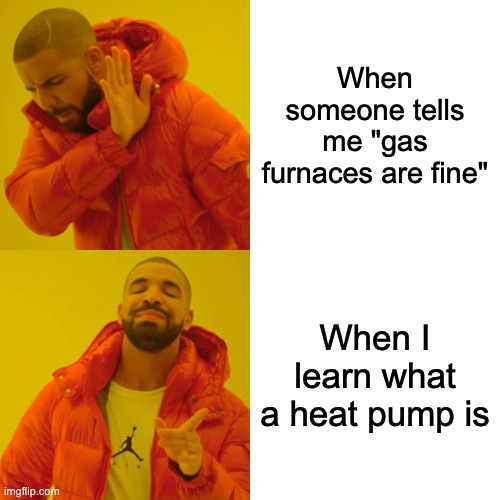If you’ve heard about heat pumps, you may have also heard some rumors: about how heat pumps don’t work well in cold climates, how they are expensive to purchase and operate, and maybe even how heat pump technology is too new for the risk of adopting it in your own home.
We’re here to tell you…
Not everything you hear is true!
We’re here to bust some myths.
Let’s dive right in, shall we?
Myth: heat pumps don’t work in cold climates
Busted! This one is our favorite to debunk, hands down. You could say we’re the experts on it, heck, we wrote the ultimate guide for it! Let’s dive into all the reasons why this myth is simply that.
Enter, the cold climate heat pump
Did you know that there are air source heat pumps specifically designed for cold climates? They’re not much different than a traditional heat pump, except they’re built to produce more heat at lower temperatures than non-cold climate rated equipment. While they look similar to a heat pump you might see in a warmer climate, the specially designed internal components are where the magic happens. This allows cold climate heat pumps to operate down to very low temperatures — as low as -20°F!
Even in the cold climates like New England and the Colorado Front Range, heat pumps are rockin’ and rollin’, keeping homes comfortable all winter long. Their efficiency, rated by something called the Heating Seasonal Performance Factor (or HSPF), can operate at a 10 or greater, meaning they’re transferring much more energy than they consume (and that’s what keeps you warm and comfortable in the cold winter months).
Still don’t believe us? Check out the data we gathered about our fleet’s performance during a brutally cold snap in the Denver area.
Myth: heat pumps cost more to operate than furnaces
Busted! There are, of course, costs associated with installing a new HVAC system. But, when you consider the robust incentives available to offset that upfront cost plus the ongoing operational savings (not to mention the quality of life improvements – we have been told by more than one customer their heat pump was “life-changing”) you have yourself one smart investment.
Ready to learn more?
Heat pumps are more efficient than gas-powered furnaces
When it comes to energy efficiency, heat pumps take the win on functionality against their gas-powered counterparts. Heat pumps in general are much more energy efficient than traditional HVAC systems. Why? Because heat pumps use electricity to move heat, rather than creating it by burning fossil fuels.
The efficiency of heat pumps is measured by the Coefficient of Performance (COP), which compares the heat output to the energy input. Heat pumps can have a COP greater than 1, meaning they can move more energy as heat than the electrical energy they consume. Traditional heating systems, such as gas furnaces, typically generate less than one unit of heat for each unit of energy consumed, making their COP less than 1.
So, what does all this mean? Heat pumps are using less energy to heat your home, which in turn can lower your energy bills. Importantly, you won’t see all these savings in the same season. We generally find that our customers see the most savings during the summer months. More on that later!
Total cost of ownership
Let’s say you’re in the market for a new HVAC system and that’s how you stumbled upon this blog post. First, welcome! We’re so glad you’re here. Second, you may be wondering “but what is this all going to cost me?”
Good news for you – we’ve got some handy numbers at the ready.
Upfront cost:
| Air source heat pump | Gas furnace | Central/window unit air conditioner | |
| Upfront Cost | $10,000- $25,000*
*Before rebates, which usually range from $2,000 – 10,000 |
$4,000-$8,000 | – $4,500-$15,000 (central) – $300-$800 (window) |
The plus of purchasing an energy-efficient heat pump is all the upfront savings made possible by rebates and tax credits (available from the Inflation Reduction Act as well as alongside state, local, and utility rebates).
Operating cost:
Okay, so we know there are great incentives available to offset your installation cost. What about actually running the heat pump?
Here’s some data that can give you a sense — for a test run in Maine (brr, talk about cold winters!), the average cost for different heating systems looked like this:
| Heating System | Annual Cost |
| Heat pump | $1,862 |
| Natural gas furnace | $2,536 |
| Electric baseboard | $5,118 |
| Oil furnace | $5,302 |
It’s worth noting that there are a lot of factors that can change these numbers – think the efficiency of the heat pump you install, the fuel and electricity prices in your area, and if you’re in a temperate or cold climate. For example, mild climates will definitely have lower operating costs than super cold ones.
Alongside this, there are other important factors that affect the cost of operating a heat pump, including the size and layout of your home (the bigger, the more expensive) and if you’re taking good care of your heat pump (cleaning your filters, calling for maintenance twice a year).
All in all, we generally see our customers saving about $250 per year, and sometimes way more (over $1,000), for those switching from more costly fuel sources. Erin, below, switched from baseboard electric heat.
“I was paying about $300-$500 monthly for electricity in the winter, and adding the heat pump cut my bills in half.” – Erin D., Denver customer
Want to see the exact math for your home? You can do a three part calculation as laid out by Shrink That Footprint.
Of course, when you work with experts (like us), we can model the savings you can expect to see so that you’re going in eyes wide open. Click here to get started!
While this is a high-level summary, it’s important to think about the total cost of ownership for your new heat pump, not just the immediate cost. The cost savings from the up front purchase combined with the lifetime savings from choosing an energy-efficient heat pump (and, the other non-financial benefits like super quiet, even heating) all deserve consideration.
Myth: heat pump technology is too new to be trusted
Busted! We don’t need to burn stuff anymore to stay warm, to cook our food, to drive our cars…it’s simply not necessary in 2024 (and beyond)!
Heat pump technology is tested, tried, and true
You may think to yourself, “if heat pumps are so awesome, why am I just hearing about them now?”
There are a few reasons that could be.
First, it shouldn’t surprise you that the big oil and gas industry doesn’t want you to know about heat pumps. Just as gas lobbies are paying influencers to use gas stoves in their cooking videos, they’re also pushing negative campaigns about heat pumps all over the world. Wild, right?
Second, heat pump technology, while it’s advanced greatly over the last ten years, has been around for longer than we’ve been alive. The technology behind heat pumps is actually over 100 years old. The first heat pump was built by Peter von Rittinger in 1856 while conducting experiments to use water vapor’s latent heat to evaporate salt brine. From there, heat pump technology advanced quickly, and in 1945, John Summer built a full scale water-source heat pump. Following that Robert C. Webber heated his home with the first electric heat pump in 1948. The rest, as they say, is home comfort history!
The advancements of building science and compressor and control technology mean heat pumps have taken center stage in the world of HVAC. For the past two years, heat pumps have outsold gas furnaces in the United States. Pretty cool, right?

Wrapping it up
Heat pumps are a smart piece of technology you can install in your home to incorporate cost savings both upon install and through the life of the product. They work fabulously in cold climates and guarantee a healthier, more comfortable climate-friendly home. The myths…have been busted.
Ready to upgrade to a climate-friendly home? Join us in building a brighter future by electrifying everything, starting with homes. Your choice today shapes our collective tomorrow!
